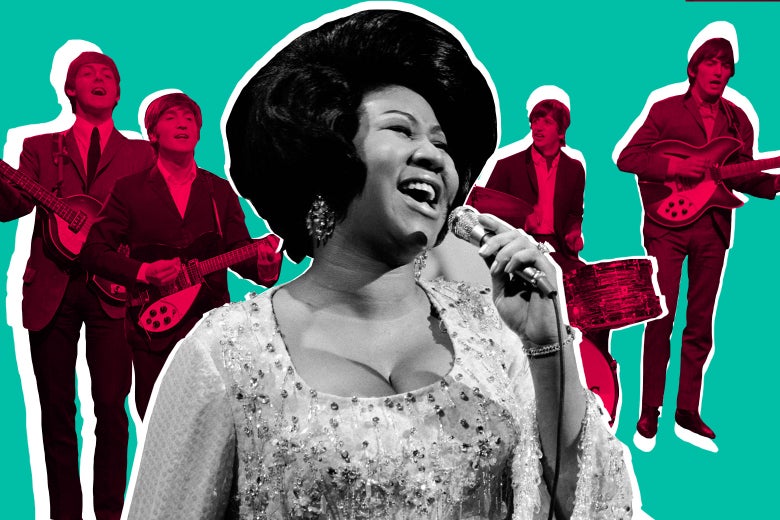
From singing “Eleanor Rigby” in the first person to why “The Long and Winding Road” is the best Beatles cover of all time
#ArethaFranklin #QueenofSoul #Respect #Beatles #RnB
Aretha Franklin’s genius took so many forms — as a singer, a songwriter, an album-crafter, a live performer. But the Queen was also one of history’s most audacious Beatle fans. Nobody ever sang the Beatles like Aretha. Since she was one of the few Sixties musicians as famous and revered as they were, she felt free to take any approach she pleased to a Fabs song — sometimes radically reworking it, as when she sang “Eleanor Rigby” in the first person. When Aretha sang any song, even a Beatle song, she claimed it as her own — and the Beatles knew it. Nothing could make them prouder than getting one of their songs stolen by the Queen. When Paul McCartney wrote “Let It Be,” he sent an acetate demo to Aretha in hopes she’d record it, knowing full well she’d outsing him on it. (Needless to say, she did.)
The Beatles’ music was always steeped in American R&B — as kids in Liverpool, they heard a sophistication and urgency in American music that inspired everything they did. From their earliest days, they played songs by Ray Charles, Smokey Robinson, the Shirelles, Little Willie John, the Marvelettes—always aspiring to live up to the spirit-in-the-dark soul of the original. They were already stars when Aretha became an overnight sensation in 1967, with her album I Never Loved a Man (The Way I Love You). She sang their songs with the irreverent bravado they brought to their American R&B covers—instead of just trying to copy the original, she took it somewhere new.
As Paul McCartney said in his statement on her death, “Let’s all take a moment to give thanks for the beautiful life of Aretha Franklin, the Queen of our souls, who inspired us all for many many years.” Like anyone else who loved music, the Beatles worshipped Aretha for her fearless spirit. And whenever she sang a Beatles song, she summed up the best in their music as well as hers.
“The Long and Winding Road” (1972)
Simply put, this is the greatest of all Beatle covers — the one that improves most on the original and defines everything the song is about. You just haven’t heard “The Long and Winding Road” until you hear Aretha burn it up in her version from Young, Gifted and Black. The Beatles’ original got botched in the studio, buried under Phil Spector’s maudlin strings and that god-awful vocal choir. It took Aretha to bring out the loneliness and pain in this song—she adds the gospel grit that the original was striving for, with a little help from Beatle pal Billy Preston on the organ. But she hears an even sadder story in the song than Paul McCartney did. She ends it by chanting the lines “Many times I’ve been alone and many times I’ve cried”—she refuses to even hint at a happy ending. Aretha never finds out if she’s ever going to get through that door, and neither do we. One of the Queen’s most brilliant and heartbreaking performances.
“Eleanor Rigby” (1969)
Aretha claims her place in the story by switching it to the first person, singing, “I’m Eleanor Rigby / I pick up the rice in the church where the weddings have been, yeah.” It’s a boldly in-your-face reinvention of the song, with the Muscle Shoals house band revving up the R&B tempo as she wails, “All over the world, the lonely lonely lonely people—where do they all belong?” Her single, which reached Number 17 on the Billboard Hot 100, feels a world away from the elegiac chamber music of the Beatles’ version, but it’s also a tribute to the original song’s pathos and compassion.
“Let It Be” (1970)
Aretha’s “Let It Be” came out in January 1970—two months before the Beatles released their version as a single. Paul McCartney sent a demo to Jerry Wexler at Atlantic Records in hopes she’d record her own version of a song that could have been written for her. Aretha gives “Let It Be” a straight rendition, touching on the line about “Mother Mary”—like Paul, Aretha lost her mother as a child, and there’s a bittersweet resonance in the way she evokes that memory. King Curtis adds a graceful sax solo.
“The Fool on the Hill” (1969/2007)
Aretha demoed “The Fool on the Hill” for her 1970 album This Girl’s In Love With You, but it never saw the light of day until it came out on the 2007 outtakes compilation, Rare and Unreleased Recordings from the Golden Reign of the Queen of Soul. Aretha’s version is just piano, guitar, and tambourine, with a touch of bossa nova influenced by the hit version by Sergio Mendes & Brasil ’66. “The Fool on the Hill,” like “Blackbird,” was a song Paul related to the struggles of the American civil rights movement—in later years when performing it live, he’d include snippets of Martin Luther King’s “I Have a Dream” speech. Aretha sings “The Fool on the Hill” with a pensive tone of her own as if she relates to the story of the solitary yogi on the hill. As she once sang: Still waters run deep, yes they do.
BY ROB SHEFFIELD
Comments
Post a Comment